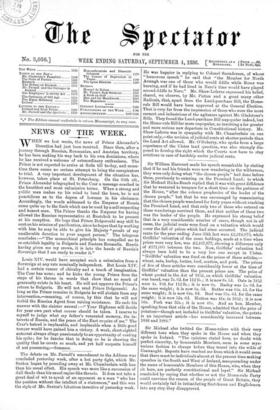Sir William Harcourt made his speech remarkable by stating that
if he and his friends were now wandering in the wilderness, they were only doing what "the chosen people" had done before them, previously to entering on the Promised Land ; to which Sir Michael Hicks-Beach replied that it was with great diffidence that he ventured to trespass for a short time on the patience of the House, "after the solemn prophecies of the leader of the chosen people," but that he was encouraged by remembering that the chosen people wandered for forty years without reaching the Promised Land, and that only two of those who entered on these wanderings survived them, and that neither of these two was the leader of the people. He expressed his strong belief that in a very considerable number of cases, though not in all cases, the judicial rents were fixed on a valuation which would cover the fall of prices which had since occurred. The judicial rents for the year ending June 30th last were £2,618,970, while Griffiths' valuation of the same holdings, made at a time when prices were very low, was £2,417,877, showing a difference only of £171,093 between the two. Now, Griffith? valuation had always been held to be a very low one except in Ulster. "Griffiths' valuation was fixed on the prices of these articles,— wheat, oats, barley, butter, beef, mutton, aid pork. The prices of five of these articles were considerably lower at the time of Griffiths' valuation than the present prices are. The price of wheat quoted in the Act of 1852, on which Griffiths' valuation was based, was 7s. 62. for 112 lb.; it is now 6s. 52. Oats in 1852 were 4s. 10d. for 112 lb.; it is now 6s. Barley was Ss. 6d. for the same weight; it is now 6s. 3d. Butter was 65s. 42. for the same weight; it is now 64s. 8d. Beef was 35s. 62. for the same weight; it is now 52s. 62. Mutton was 41s. in 1852; it is now 56s. Pork was 32s.; it is now 48s. And an hon. Member, speaking from that side of the House, admitted that the price of potatoes—though not included in Griffith? valuation, the potato is an important article—has considerably increased between 1848 and 1884."


































